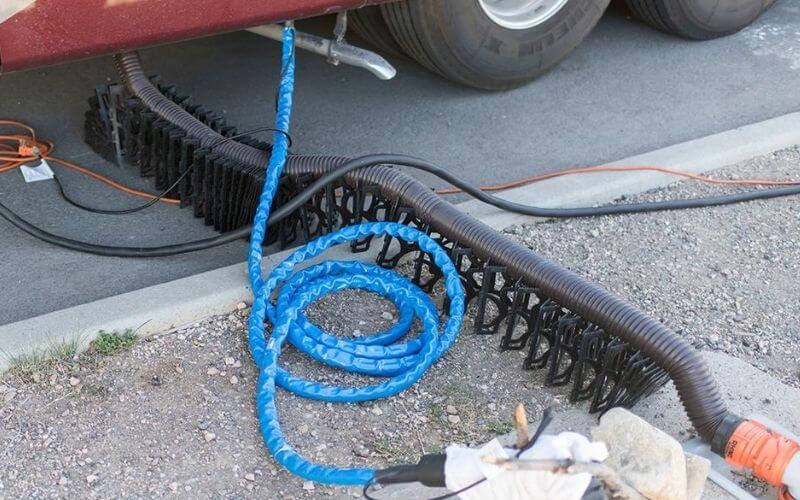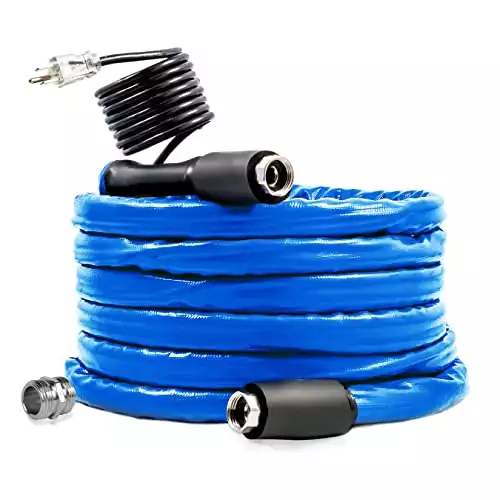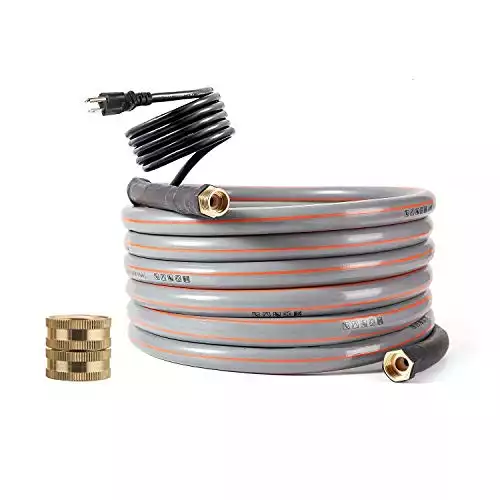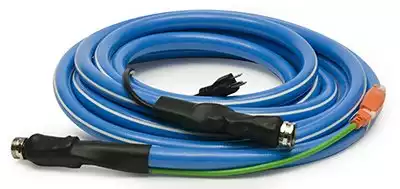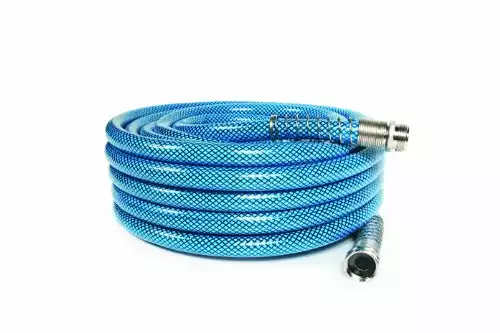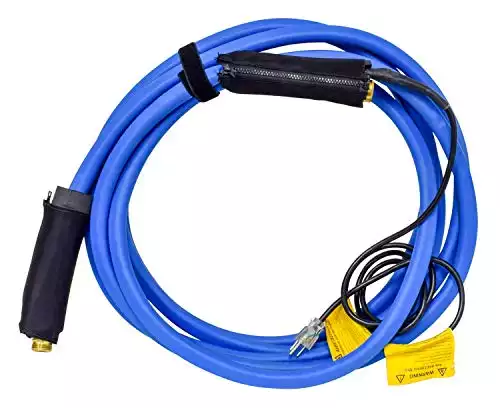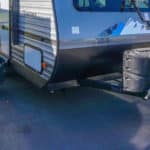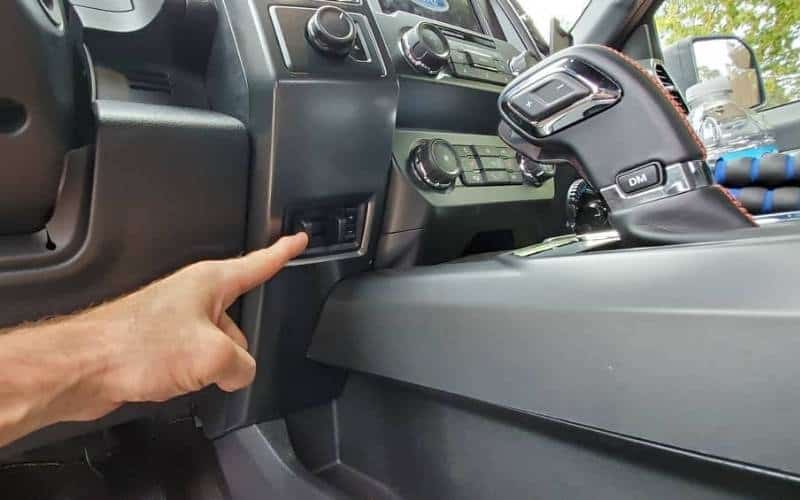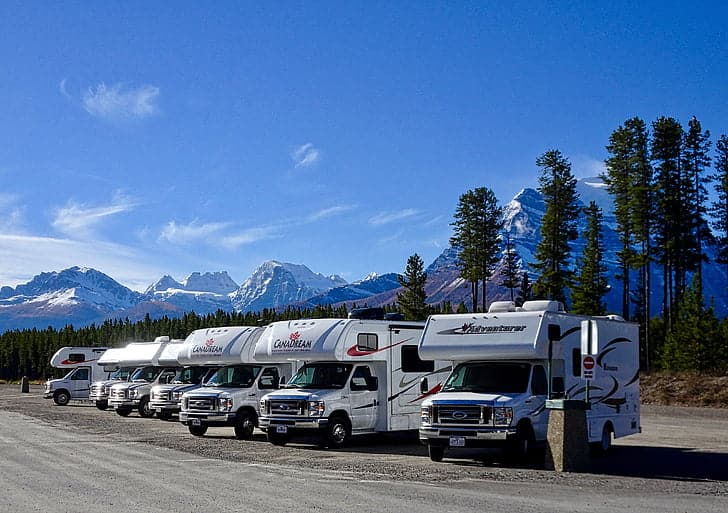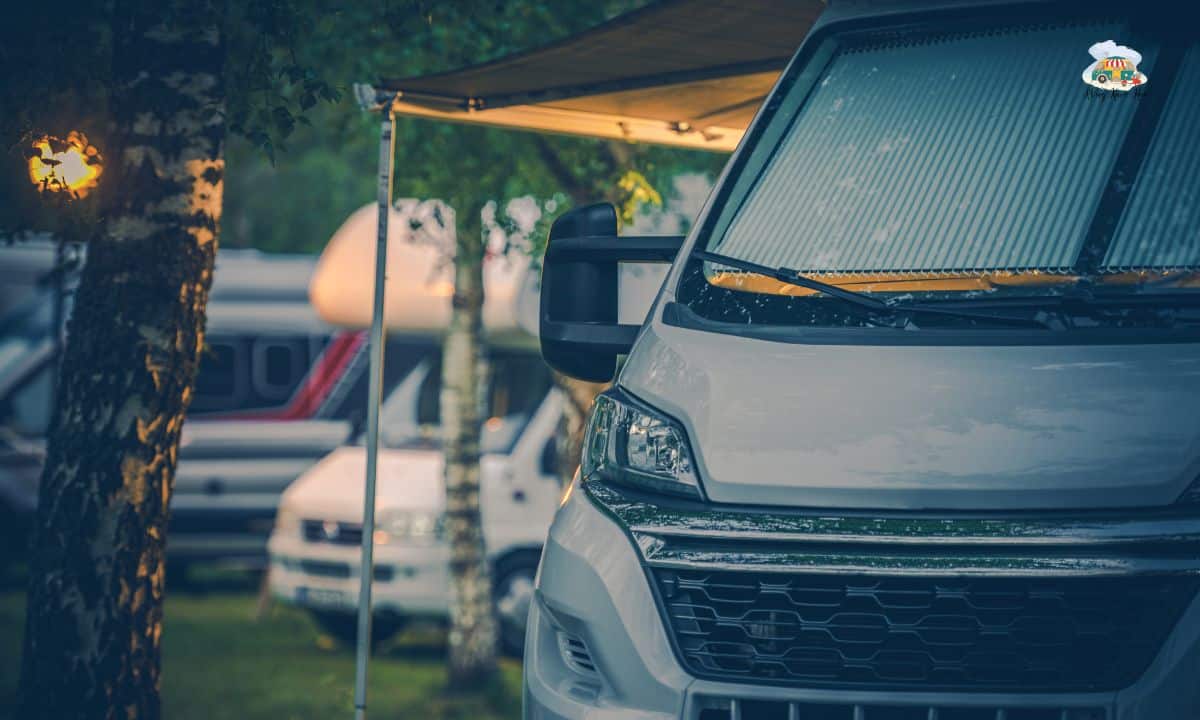If you ever encounter cold nights living in your RV, you need a heated water hose.
This is your first line of defense against larger issues with the internal drinking water pipes in your RV when temperatures drop below freezing.
Take it from someone who spent an entire winter living in an RV just north of Lake Tahoe.
My RV heated water hose use saved our plumbing while all I could do was feel sorry for my campground neighbors that didn’t invest in one early enough.
A frozen water hose is one issue that can typically be solved with mild heat and time. But frozen water pipes inside your RV often lead to cracking.
If this happens, you’ll be in the unfortunate position of having to replace your pipes and you might also have to deal with significant water damage inside your rig.
So getting an insulated RV water hose use is the easiest and most affordable way to protect the pipes and get smooth flowing drinking water in your rig if you live in a colder climate.
But not all of the insulated water hoses that “claim” to protect your hose from freezing actually hold up when conditions are at their worst.
Trust me, I’ve known plenty of people who bought a heated water hose and still had their pipes freeze.
But fortunately for you, we’ve canvassed the market to bring you the 5 best options for a new heated water hose for RV applications.
Read the following heated RV water hose reviews to learn which will give you safe drinking water while cold weather camping.
5 Best Heated Water Hoses for RV in 2024
A quality heated RV water hose really needs to feature two major components: insulation and some sort of heater coil.
So that’s a great place for you to start when evaluating these water hose options, but the easy way to continue your evaluations is to look closely at what we liked and didn’t like for each of these hoses.
That will help you start to narrow down your options before you read through our Buying Guide!
Here are the top 5 best RV Heated Water Hoses To Keep your drinking water line hose running When temperatures drop below freezing.
1. Best Overall Heated Water Hose: Camco 25ft TASTEPure Heated RV Drinking Water Hose
If you’re looking for a versatile heated RV water hose that gets our vote for the best overall option on the market, look no further than the Camco 25ft TastePure Heated Drinking Water Hose.
The 25-foot length on this insulated rv water hose is plenty for most RV campsites and the hose itself is NSF-61 certified and free of lead and BPA.
From personal experience, this is the exact insulated RV water hose I trusted for a full five months of freezing temperatures.
It has an all-weather, PVC insulated exterior sheath surrounding the hose itself. In between that sheath and the hose is where the heated coil runs.
And it’s rated to keep your water from freezing in temperatures down to -40 degrees Fahrenheit.
The RV fresh water hose requires a 120-volt AC power connection and draws approximately 2.27 amps when turned on.
It offers plug-and-play functionality and you won’t have to worry about turning it on and off every day. Just plug it in and let it keep your water from freezing.
The hose itself has a half-inch inner diameter for decent water flow and it’s also reinforced for superior kink resistance.
This can be a problem with other hoses but I personally never had any trouble with this hose kinking and stopping water flow while I used it.
It has a self-regulating heat source with a small thermometer at one end of the hose.
That end is designed to be hooked up to your city water connection because (in theory) that’s going to be the colder end of the hose when compared to where it connects to your RV.
But it does come with matching female hose fittings so that you have the option to plug it into your RV or directly into the power station at your campsite.
Those fittings are also nickel-plated to provide a heavy-duty design that won’t falter with extended use.
Things We Like
Things We Don’t Like
2. Best PVC-Free Hose: H&G lifestyles Self-Regulating 12 FT heated hose For RV
If you want a heated water hose that’s PVC and lead-free, we’d recommend the H&G Lifestyle Heated Water Hose For RV.
This RV water hose is 12 feet long and rated to provide safe, clean drinking water, while also keeping it from freezing in temperatures down to -20 degrees Fahrenheit.
It plugs into a 120-volt AC power connection and it draws a lowly 0.8 amps when plugged in.
So it’s also one of the more energy-efficient heated water hoses on our list.
And it features matching female fittings on either end so that you can plug it into your RV or the power station at your campsite.
And speaking of those fittings, they’re made of solid brass construction for great durability when used for a full winter.
The outside of the heated fresh water hose also features an abrasion-resistant cover to protect it from the elements when it’s sitting outside of your RV all winter.
The heating coil in this hose are implemented directly into the hose itself. This design provides uniform heating and unrestricted water flow.
Things We Like
Things We Don’t Like
3. Best 100-Foot Hose: Pirit PWL 100FT heated water hose
Those of you searching for some extra length to get water from your city water connection into your RV should look into the Pirit PWL-03-100 100’ Heated Hose Series IV.
This is a 100-foot hose that’s rated to keep your water from freezing when temperatures dip as low as -42 degrees Fahrenheit.
This is also an extremely durable hose that’s built to withstand high water pressures up to 200 PSI.
It includes a 10-foot power hose with a lighted plug to help you confirm that it’s working and see it if you need to make any changes at night.
The hose plugs into a 120-volt AC power connection and draws a maximum of 4.5 amps when plugged in.
It has a male fitting on one end and a female fitting on the other, so you’ll need to do a little planning to make sure you install this hose in the right direction.
And for some RVs, this hose might require an additional adapter for compatibility.
The heating coil on this model is integrated into the hose itself for more even heating.
And it also includes a thermostat-control so the heating coil only turns on when it’s absolutely needed.
Things We Like
Things We Don’t Like
4. Best Budget-Friendly Hose: Camco 22853 Premium Lead Free Drinking Water Hose
If you’re absolutely set on getting the most budget-friendly heated water hose possible, we’d suggest the Camco 22853 Premium Drinking Water Hose.
This is a 50-foot RV water hose and it’s 20 percent thicker than most standard RV drinking water hoses.
It has an inner diameter of 5/8ths of an inch and the hose itself is lead, BPA, and phthalate-free to provide safe, clean drinking water.
This hose construction also means that it won’t leave an annoying plastic taste in your water.
The hose has machined fittings on either end that provides strain relief for extra durability.
This is a really important point because these fittings tend to be one of the areas where hoses tend to fail or break when used for extended periods.
It’s also UV-stabilized for improved longevity and it’s NSF-certified so you can be sure you’re drinking safe water.
It also features an anti-kink design that helps to guarantee smooth water flow even when under pressure.
And while it’s also compliant with California’s Low Lead content laws, this RV heated water hose doesn’t actually include a heating coil.
It’s additional thickness will, indeed, make it more resilient to cooler temperatures than standard RV hoses, but you might need to wrap it in additional insulation if you intend to use it for a full winter of freezing temperatures.
Things We Like
Things We Don’t Like
5. Best With Zippered Installation Cuffs: Valterra 5325 Heated 25ft Fresh Water Hose
If you’re looking for a hose that will give you easier access to the hose fittings once you’ve winterized your rig, we recommend the Valterra W01-5325 25’ Heated Fresh Water Hose.
This hose offers a 25-foot length and is rated to keep your water from freezing if temperatures go below zero.
One of the areas that some hoses fail to protect is the fittings where your hose connects to your RV and your city water connection.
If left uninsulated, these areas are still likely to freeze even if the water in your hose is still in liquid form.
This is why many hoses have foam or rubber sleeves that are designed to be pushed up and around the fittings at either end of the hose.
The only problem with these sleeves is they can sometimes shrink and become very difficult to move if you do need to disconnect your hose for any reason.
Valterra has solved that issue by designing their hose with zippered installation cuffs. These cuffs can easily be removed or installed as needed.
And when they’re installed, they provide ample protection for your hose fittings.
This rv heated water hose requires a 120-volt AC power connection and it features a self-regulating heating coil that naturally senses the external temperature and turns on or off as needed.
This hose also offers a half-inch diameter to allow water to flow through at a decent rate.
Things We Like
Things We Don’t Like
How To Choose The Best Heated Water Hose For Your RV
So now that you have some great options on the table for a new heated water hose for your RV, it’s time to sort through those options to select the absolute best one for you.
And here are the factors you can use to help you narrow down your choices.
Hose Length
The first criterion you can use to narrow down your hose options is length.
Consider how far you typically park your RV away from city water connections and power stations when you park at new campsites.
For me, I’ve been there done that with getting a hose that’s too short, so I tend to err on the longer side.
However, there can be a downside with having a longer water hose when temperatures go below freezing.
When it’s really cold outside, a longer hose will increase the amount of time that water is above ground and exposed to cold temperatures as it travels from your water connection into your insulated RV.
This is why a 50-foot hose isn’t always the best if you live where it’s consistently below zero at night.
But on the other end of things, a 12-foot hose is flirting with danger and significantly increases your odds that your hose won’t reach your water connection when you pull into a new campsite.
For our money, the sweet spot for the best length for a heated water hose for RV use is 25 feet.
This length provides a great balance between usability and minimizing exposure to keep your water from freezing.
Hose Diameter
A water hose’s diameter has a lot to do with how much water it can move and how efficiently it can do so.
A hose with a larger diameter is naturally going to be able to move more water at a faster rate than a hose with a small diameter.
Additionally, a RV water hose with a larger diameter will have more water inside of it at any given time.
This means that there’s more liquid to freeze than will be inside a hose with a smaller diameter.
Having more water inside the hose at a given time will increase the amount of time that the water will take to freeze.
So having a thicker heated RV fresh water hose is a good way to increase the odds that your water doesn’t freeze at lower temperatures.
In our opinion, you should look for a heated RV water hose that has a minimum diameter of a half-an-inch.
Materials
The materials used in a hose’s construction will dictate its durability and the cleanliness of the water that comes through it.
Most of these RV hoses are made with a standard rubber material that’s free of lead and BPA. These are elements that most of us don’t want in our drinking water these days.
While there are hoses out there that feature a combination of rubber and vinyl material, a rubber-only design still tends to be more durable and long-lasting.
Rubber fresh water hoses are also more resistant to kinking, cracking, and UV damage. And they have a better ability to handle hot water than hoses made of other materials.
Some hoses utilize a PVC coating to provide extra insulation and temperature resistance.
While some hoses boast a PVC-free design for improving water quality, it’s important to note that PVV is typically used in exterior coatings that never have direct contact with your drinking water.
Burst Pressure
Burst pressure is the maximum pressure that a hose can withstand before it…well…bursts! This pressure is usually measured in pounds per square inch (PSI).
The unfortunate thing is that water won’t always come out of city water connections at the same pressure.
There’s no water pressure standard (at least in the US), so you’ll need a hose that can handle high pressures.
Some of the most durable hoses out there can withstand pressures up to 200 PSI. But not all hoses readily advertise the maximum pressure they can withstand.
So the best way to find this information is to canvas user reviews on multiple online retailer sites. In addition to Amazon, consider looking at reviews on sites like Camping World, Wal-Mart, and Home Depot.
These reviews can tell you a lot more information than the manufacturer’s ad copy will.
But if you’re really worried about the burst pressure of your hose not being enough, you can also look into attaching an RV water pressure regulator to either end of your hose.
Couplings And Fittings
The fittings at either end of your water hose are the most likely component to break or fail over time.
This is because these fittings are under the most stress when your hose is screwed into the side of your RV.
To this day, I still don’t know why most water connections on RVs are designed to screw a hose directly into the side of the RV.
This design puts a lot of downward pressure (because, you know, gravity!) on the hose, the fitting, and the water outlet on the side of your RV.
There’s a reason why most of the water faucets on the outside of your hose face down and are designed to screw your hose on vertically.
That being said, I can’t change the way RVs are manufactured, but I can recommend that you look for a heated water hose with fittings made of solid brass or other heavy-duty metals.
These fittings are going to be stronger and more durable when that downward pressure stays on them for months at a time.
Otherwise, you risk fitting or faucet damage that can render you without water when you need it most.
Additionally, RV water hoses come with either female fittings on both ends or a female fitting on one end and a male fitting on the other.
The advantage of having female fittings on both ends is that you’ll be able to hook the hose up facing either direction.
This is really important for heated RV water hoses because it gives you the freedom to plug in the heating coil to your RV or the AC outlet on your campsite’s power station.
Other models that have a male fitting on one end and a female fitting on the other will have to be aligned properly before installing it.
And while this isn’t that big of a deal, I’d always opt for a heated water hose that gives you the most flexibility possible.
Price
To be honest, there’s a chance that you’ll be slightly surprised by the price of some of these insulated rv water hoses.
But you have to remember that the cost of replacing a cracked water tank or pipes is going to be exponentially higher than the price tags on the best heated fresh water hose for RV use.
If you do want to go low, you can find a heated RV water hose for less than $40. And if you opt for a high-end model that’s going to be extra durable, you can certainly find fresh water hoses that will cost more than $200.
For our money, we’d recommend identifying a hose that falls in the range between $60 and $180.
So, What Is The Best RV Heated Water Hose?
The Camco 25ft TastePURE Heated Drinking Water Hose is my choice for the best overall heated water hose for RV use because I’ve used it for a full winter of RV camping in sub-freezing temperatures and never had an issue. It was super easy to install and incredibly reliable.
This insulated rv water hose is rated to keep your water from freezing when temperatures go down to -40 degrees Fahrenheit and the hose itself is lead and BPA free so you can be certain you’re still getting safe and clean drinking water.
But if you’re looking for an option that’s going to be a little more friendly on your wallet, we’d suggest the Camco 22853 50ft Premium Drinking Water Hose.
This rv heated hose is 20 percent thicker than your typical RV water hose and it has anti-kink properties so that you don’t have to worry about water flow being restricted when the hose is under pressure.
That being said, this hose doesn’t have a true heating coil in it. So it’s only good for RV camping when overnight temperatures only get down to the mid-30s at the lowest.
But it does offer a more resilient and weather-resistant hose option at a much more affordable cost than most of the hoses on our list.
Frequently Asked Questions
These hoses are relatively simple to use. Most of them offer plug-and-play functionality and they require a matter of seconds to install.
That being said, freezing water is never a good thing for your RV. So let’s answer a few more of these questions to help you avoid common issues related to cold-weather RV living.
How do I prevent my RV pipes and water tank from freezing?
The first thing you should remember is that the temperature inside your RV is always going to be different from the temperature where your water pipes and tank are located.
So the thermostat inside your rig is never a good indicator of whether or not your pipes and tanks are safe from freezing.
If the water inside of your pipes freezes completely, it will expand. It is this expansion that can cause your pipes to crack or burst.
Most modern RVs have water pipes that can slightly expand before cracking, but if you have an older RV, you’ll need to be even more careful when temperatures go below freezing.
If you don’t have a heated water hose for RV use, the best way to protect your pipes and tank from freezing is to disconnect your city water hose before temperatures go below freezing.
In addition, you should consider putting a heat lamp or drop light in the underneath compartment where your potable water tank is located.
If you do take this approach, make sure you choose a light or lamp that has a cage around it.
Otherwise, the heat of the lamp can melt anything that it comes in contact with. This can result in damage and can also pose a significant fire risk if left unattended.
Additionally, you can consider getting an RV skirt to enclose the entire area underneath your RV, travel trailer, or 5th wheel.
An RV skirt will keep the temperature underneath your rig higher and reduce the likelihood of frozen pipes or water tanks.
Will one freezing night cause damage?
It can! Sometimes it only takes one night of oversight for freezing temperatures to cause significant damage to your RV’s water pipes and tanks.
Do I really need a heated water hose for MY RV?
Only if you plan to spend any time in sub-freezing temperatures! When I’ve done RV camping in climates where I knew it was always going to remain above freezing at night, I never worried about having a heated water hose.
That being said, I’ve heard way too many horror stories about RV complications related to freezing temperatures.
And I know from experience that a heated water hose is the best way to keep your RV’s water system working properly if you plan on spending any time in places where it dips below freezing at night.
Can I just use heat tape on my existing RV water hose?
Sure. I’ve seen plenty of people do it, but I know that it’s nowhere near as effective as getting a quality heated water hose.
This DIY method also means buying more materials and spending more time in the installation process, not to mention the fact that it produces more waste.
So while it might sound better to just buy some heat tape and wrap it around your existing hose, the amount of time you need to spend for this DIY application may end up being a larger investment than if you simply buy a new heated water hose for RV use
Conclusion
Keeping yourself (and anyone else living in your RV) warm during the winter months should be your primary concern.
If you set yourself up with one of the best-heated RV water hoses, you won’t have to worry about pipes or tanks freezing and you’ll be freed up to focus on making your winter RV experience more cozy and enjoyable.
But if you neglect to buy and install one of these hoses before the temperatures consistently creep below zero, you could find yourself dealing with major RV repairs at a time of year when you’d rather not be spending very much time outside.
So we hope you take the reviews and insights we’ve provided to heart and use them to select a new heated water hose for your RV!

